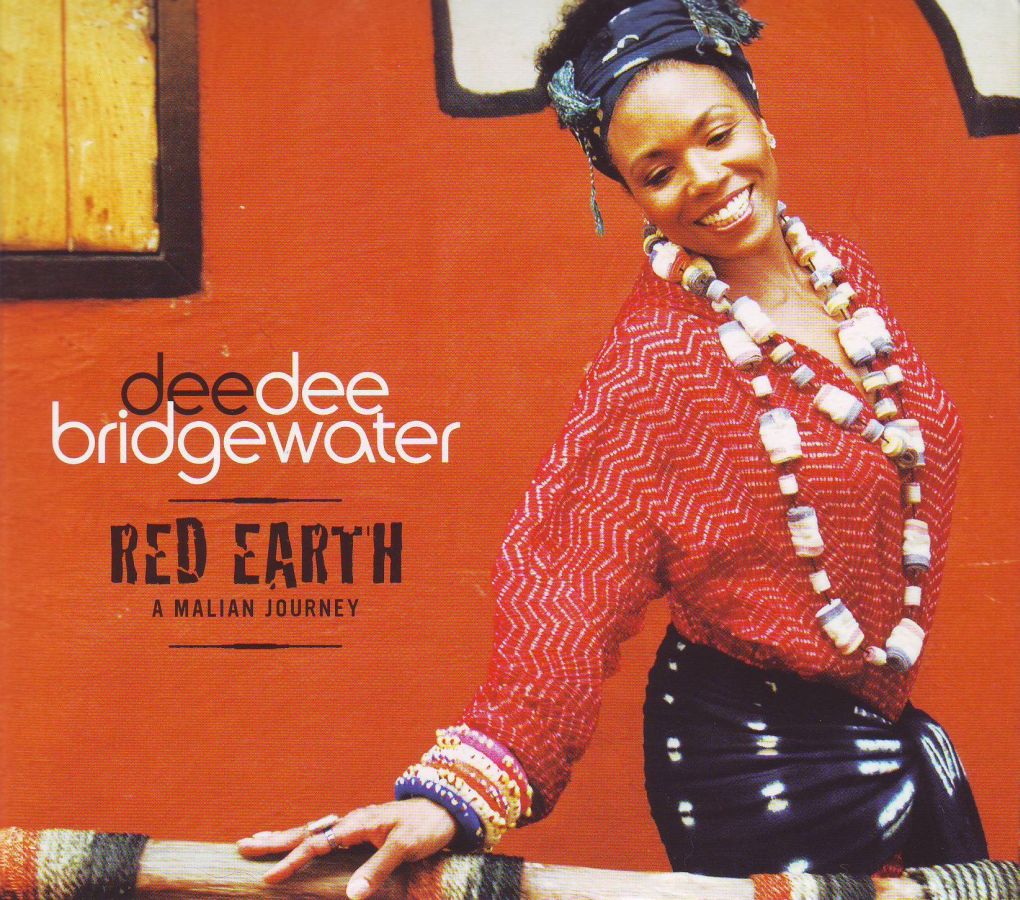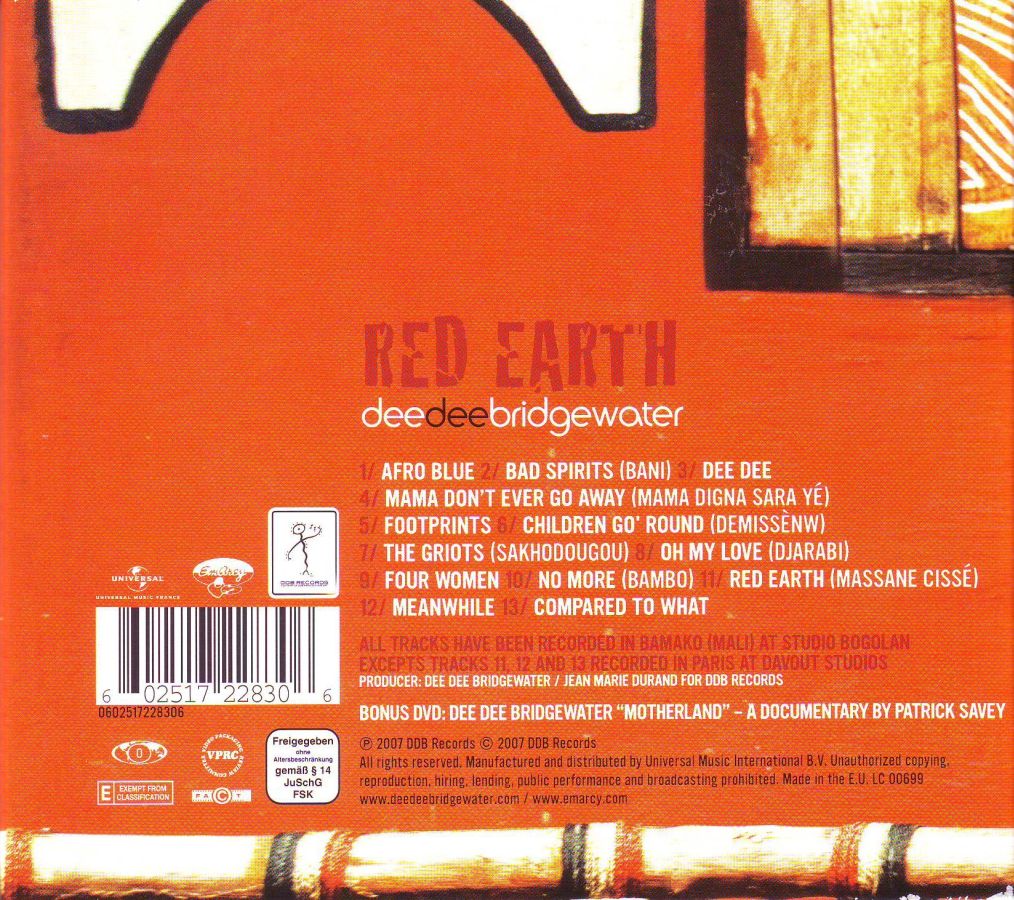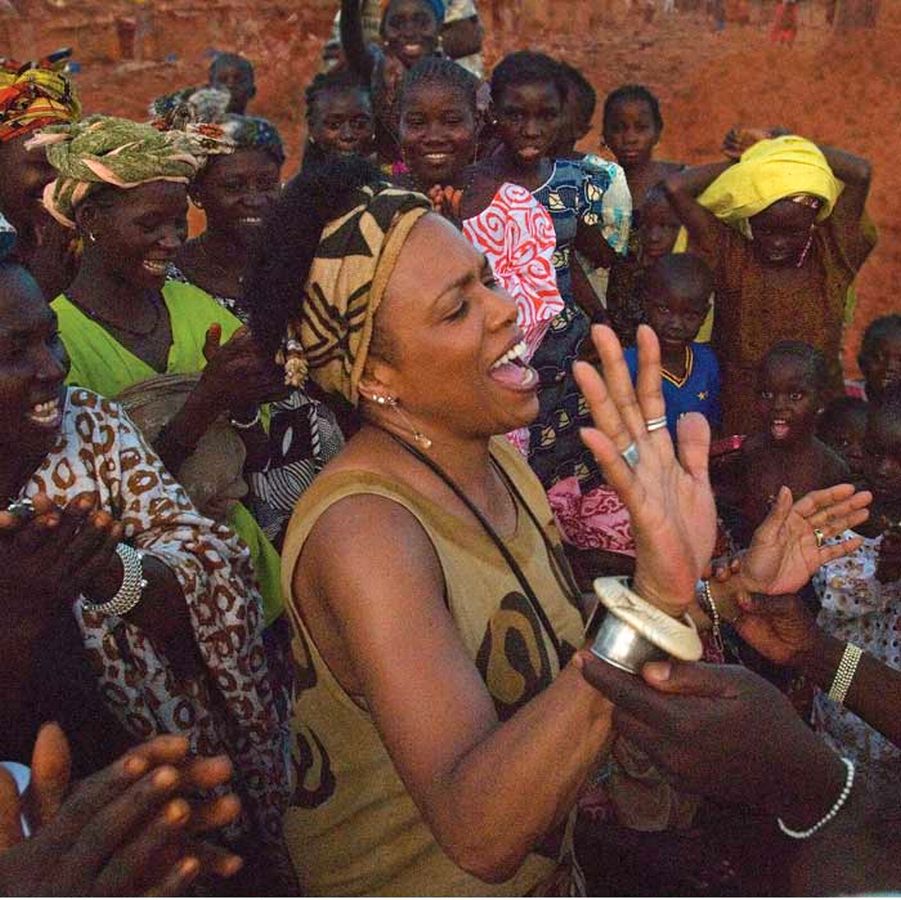| |
| viernes, 30 de octubre de 2009 |
Dee Dee Bridgewater - Red Earth: A malian journey - 2007
Decca Music Group
En este post info y links de las dos versiones de este muy buen trabajo de Dee Dee. La info tomada de aquí y de allí en la web; los links propios de mi "depósito virtual" en medifire.


http://www.mediafire.com/download.php?jljmjzotwmz
mp3, 192
Dee Dee Bridgewater es una cantante de Jazz que siempre ha estado muy influenciada por Ella Fitzerald, aunque ha tocado muy variados estilos dentro del jazz. Pero esta vez ha decidido buscar sus raíces africanas. Además de a su pianista batería y bajista, Dee Dee trae a todo un arsenal de músicos. Dee Dee Bridgewater, utiliza su voz y su encanto para rendir homenaje a sus raíces africanas, consiguiendo un album espectacular, con mucho ritmo y fuerza.
Lo que más gusta: Los músicos de Mali: sin duda, el balafón y el kora fueron increíbles (el xilófono y la guitarra tipo medio balón de con un palo clavao).
Dee Dee Bridgewater, Embajadora de Buena Voluntad de la FAO y Caballero de la Orden Nacional del Mérito y Oficial de las Artes y las Letras de la República Francesa, presenta su trabajo RED EARTH – A malian journey, un regreso a sus raíces africanas, escribiendo ella muchas de las letras de las canciones.

Aquí puede verse a Dee Dee en Mali
El disco supone un viaje iniciático a Mali que Bridgewater realiza para descubrir sus raíces africanas. La fusión de voces, música e instrumentos tradicionales de Mali con la música de jazz norteamericana autóctona, su conexión instintiva con el blues de este país africano, y su unión inexplicable hacia la tierra roja, el signo antiguo de las fuerzas de la vida y la tierra de sus ancestros, han posibilitado que Dee Dee Brigdewater culmine con este trabajo su decisión de encontrar sus raíces.

En esta foto puede verse a Dee Dee junto a Oumou Sangaré que participó en el disco.
Tracks:
01. Afro blue 5:10
02. Bad spirits (Bani) 5:47
03. Dee Dee 2:55
04. Mama don't ever go away (Mama digna sara ye) 5:38
05. Long time ago 6:47
06. Children go 'round (Demissenw) 6:05
07. The griots (Sakhodougou) 6:02
08. Oh my love (Djarabi) 6:02
09. Four women 5:22
10. No more (Bambo) 4:44
11. Red Earth (Massane Cisse) 5:15
12. Meanwhile 4:23
13. Compared to what 5:21
Personnel:
Dee Dee Bridgewater: vocals
Edsel Gómez: piano
Ira Coleman: bass
Minino Garay: drums, caxixi, cajón, percussion, cymbals
Baba Sissoko: vocals, tamani, n'goni
Lansiné Kouyaté: balafon
'Petit' Adama Diarra: djembe
Laminé Tounkara: doum-doum
Cheick Tidiane Seck: shakeres, karignan, vocals, Fender Rhodes, calebasse, Hammond B3 organ
Kassé Mady Diabaté: vocals
Djelimady Tounkara: guitar
Fantamady Kouyaté: guitar
Toumani Diabaté: kora
Habib 'Dia' Sangaré: bolon
Alou Kouloubali: calebasse
Mamani Keita: vocals
Zoumana Tereta: sokou
Cherif Soumano: kora
Kabiné Kouyaté: vocals
Fatou Diawara: vocals
Fatoumata 'Mama' Kouyaté: vocals
Ramata Diakité: vocals
Benogo Diakité: kamalengoni
Kassim Sidibé: kamalengoni
Habib 'Dia' Sangaré: bolon
Ami Sacko: vocals
Bassékou Kouyaté: n'goni
Omar Kouyaté: n'goni
Moussa Bah: n'goni
Andra Kouyaté: n'goni
Gabriel Durand: guitar
Moussa Sissoko: tamani, djabara, shakeres
Aly Wagué: flute Peul
Lansiné Kouyaté: balafon
Moriba Koita: n'goni
Oumou Sangaré: vocals
Cheick Oumar 'Sékou': djembe
Yahkouba Sissokho: kora
Maré Sanogo: doum-doum
Tata 'Bamba' Kouyaté: vocals
Modibo Kouyaté: guitar
Adama Tounkara: n'goni
Mamadou Diabaté: kora
'Djifli' Mamadou Sanogo: djembé
'Pepito' Sekouba Kouyaté: tamani
Oumou Sacko: vocals
Fati Kouyaté: vocals
Ami Sacko: vocals
Jacob Soubeiga: guitar
Moussa Sissokho: djembé
Lassy 'King' Massassy: vocals

En la foto puede verse a algunos de los músicos que intervienen en el disco:
Sentados (izquierda a derecha): Minino Garay, Dee Dee, Cheick Tidiane Seck, Benogo Diakité, Habib ‘Dia’ Sangaré
Parados (izquierda a derecha): Edsel Gomez, Zoumana Tereta, Ira Coleman, Baba Sissoko.
Dee Dee Bridgewater - Red Earth - A Malian Journey
Ms. Bridgewater is touring with a band that includes her jazz trio along with some wonderful Malian performers. The band includes Ira Coleman on bass, Edsel Gomez on piano, Minino Garay on percussion and drums, Baba Sissoko on n'goni, Assitan Kita providing background vocals, Kabin Kouyat also on background vocals, Lansiné Kouyaté on balafon, Adama Diarra on djembé and Mamadou Cherif Soumano on kora.
With a voice that sits comfortably among the last century's greatest female jazz singers, Dee Dee Bridgewater has created a breathtaking and innovative new vision of jazz on her new album Red Earth. By retracing her Africa roots to Mali and combining the rich tradition of jazz with the equally rich African music traditions she has created a totally organic musical experience.
Dee Dee Bridgewater is first and foremost a groundbreaker, an artist whose projects have traversed the musical kaleidoscope - from traditional vocal jazz to searing scat interpretations. Unafraid and uninhibited, these attributes make her perhaps the most versatile and inspiring artist and producer of her generation. Drawing on a deep font of talent and inspiration, Bridgewater's new project, “RED EARTH - A Malian Journey," is a journey both forward and back. Melding Malian voices, music and traditional instruments with American jazz vernacular and penning many of the lyrics, Dee Dee Bridgewater has crafted one of her most important musical statements to date.
Bridgewater explains, the album is “the culmination of my decision to find my African roots. It was an idea I first had when doing Horace Silver's music, which is so syncopated and rhythmic." The resulting Grammy nominated album love and peace: A Tribute to Horace Silver solidified her resolve to further investigate African music. With the death of Ella Fitzgerald in 1996 and Dee Dee's subsequent double Grammy Award winning tribute Dear Ella, the project was put on hold. Her ensuing projects, Live At Yoshi's, This Is New, and J'ai Deux Amours, incorporated more global sounds and influences and yielded Grammy nominations for two of the albums.
Elected in 1999 as one of the United Nations' first Ambassadors for the Food and Agriculture Organization (FAO), Bridgewater was granted the unique opportunity to travel to Africa, visiting villages involved with various FAO programs. Over the years, Dee Dee amassed a library of music from Nigeria, Ivory Coast, Senegal, Congo, Benin, South Africa and Madagascar amongst others. As she narrowed her focus, one country's music came to the fore. “Whenever I heard it, I would get a jolt." Bridgewater recalls. “In the end of 2003, I started thinking it must be Mali. I had an inexplicable knowledge and ability to scat to and comprehend this rhythm and music".
However, it was not until August 2004 that Bridgewater decided to make the long-awaited trip to Mali. It was during this first voyage that Dee Dee intensely felt she had found her ancestral home. Her instinctual connection to Malian “blues", an inexplicable draw to the red earth - the ancient sign of life forces and land of her ancestors - and her amazing resemblance to the Malian tribe called 'Peul' all confirmed her suspicions, drawing her in with undeniable spiritual force.
For their first trip to Mali, Bridgewater and co-producer/husband Jean-Marie Durand enlisted the aide of Cheick Tidiane Seck, who had produced jazz pianist Hank Jones' 1995 celebrated Verve release Sarala, to serve as their musical chaperone. Seck provided a portal to the country's brightest musicians and singers and with his involvement the music began to take shape. Cheick Tidiane Seck “is responsible for the involvement of all the Malian musicians on this project, as well as selecting the traditional Malian songs," says Bridgewater. “We both agreed that the project had to have traditional Malian instruments, as we were fusing traditional Malian music with the traditions of Jazz." It was during this visit that Seck introduced Bridgewater and Durand to Malian Minister of Culture and filmmaker, Cheick Omar Sissoko, who gave the group use of an official vehicle and driver, allowing them to tour different regions and take in the culture of the country.
During a subsequent visit in August 2006, Mariam Nour, the Malian representative for the UN Food and Agriculture Organization, invited Goodwill Ambassadors Bridgewater and Oumou Sangaré to tour villages involved with local FAO programs. One village's women raise bees for honey, soap, candles and other products and run a cooperative selling these goods near Mali's capitol, Bamako. In another, a woman was lent the funds to procure livestock with the caveat that they be either sheep or goats. She purchased one sheep and ten ewes, which allowed her to breed animals that could be sold to repay the loan. She then gave a portion of the proceeds to another woman in a different village to continue the program herself. A third village's women were learning micro-agricultural irrigation practices involving square plots of land from a doctor from Haiti. Bridgewater marveled, “It was a wonderful experience, one that has irrevocably changed my life forever".
The roles and influences of women are intrinsically interwoven in Malian politics and culture. In this vein, Dee Dee wanted to bring the strong feminine aspect of Mali to Red Earth - A Malian Journey. One song, 'Bambo (No More)', composed by Tata 'Bambo' Kouyat, was so powerful that it led the government to abolish forced marriage in the 1960s. In addition to including “Bambo" on the album, Dee Dee made the conscious decision to feature female vocalists like outspoken women's rights advocate Oumou Sangaré, Ramata Diakité, rising star Mamani Keita and Fatoumata “Mama" Kouyaté, the “golden voice of Mali". Bridgewater says, “I felt such a strong sisterhood with all of these dynamic women." It was important for her to highlight this less explored part of the culture, which she feels has a distinct influence on the people and their music".
Songs “Bani (Bad spirits)", “Sakhodougou (The griots)", and “Massane Cissé (Red Earth)", which originated in the Twelfth and Thirteenth centuries, are told in the oral tradition of the 'Griots'. These time-honored storytellers of Malian and family history are charged with carrying the vocal and musical customs forward through the generations. In deference to the importance of these traditions, Bridgewater features lauded 'Griots' Kasse Mady Diabaté, up-and-coming talent Kabin Kouyaté, and musical griots Bassekou Kouyaté, Toumani Diabaté and Baba Sissoko, whom Dee Dee considers her personal “griot". In working with the 'Griot' songs, as well as some of the other songs, Dee Dee tried to remain faithful to the original story, while at times lending a more updated nuance. This is the case with “Massane Cissé (Red Earth)" and the updated Segou 'Griot' song, “Demissenw (Children go 'round)". Interspersed are original compositions “Mama digna sara ye (Mama don't ever go away)" and “Djarabi (Oh my love)".
“Jean-Marie [Durand] and I worked with Basskou Kouyat in setting up jam sessions at his house. I improvised rhythms and lyrics. “Children Go 'Round" came out of that." Four n'goni players, two percussionists and Basskou's wife, Ami Sacko improvised with Dee Dee. At Basskou's urging, Bridgewater's youngest child, son Gabriel Durand, was invited to sit in on guitar. The organic outgrowth of that experience was so successful that Bridgewater recorded the tune with Basskou's group “N'goni Ba" in one room with son Gabriel featured on guitar. “That's why it has such a different sound. Mixing it was almost impossible because everyone bled together - voices and instruments melded, but that was the original album concept. It would have been quite an undertaking to do the whole album that way, but it was great to get that one song", says Bridgewater describing the raw and honest quality of the track.
The title of the album Red Earth - A malian journey was serendipitous. On the morning of her first day in Mali, Bridgewater was overwhelmed at the view from her hotel room - red earth stretching out before her with the Niger river coursing in the distance. It reminded her of the stories her mother told her of her childhood love of rolling in the red earth of Memphis. Dee Dee pensively offers, “I'm just trying to find my voice and my reason to be. Doing this project I feel that I've found something incredible - my African roots and my home, Mali".
Dee Dee Bridgewater - "Red Earth" - Live at Jazz Open Stuttgart - 2007

http://www.mediafire.com/download.php?jjjdhklfvly
mp3, 192
Personnel:
Dee Dee Bridgewater, vocals
Ira Coleman, stand-up electric bass, musical director
Edsel Gómez, piano
Lansine Kouyaté, balafon
Baba Sissoko, n'goni
Adama Diarra, djembe
Mamadou Cherif Soumano, kora, guitar
Kabine Kouyaté, vocals
Assitan Kita, vocals
Minino Garay, drums, cajón, percussion
Recorded live at Jazz Open Stuttgart, Germany, July 12, 2007
Tracklist:
1. Afro blue
2. Bani (Bad spirits)
3. Footprints
4. Demissénw (Children go round)
5. Sakhodougou (The griots)
6. Massane Cissè (Red Earth)
7. Compared to what
Dee Dee Bridgewater:

Dee Dee Bridgewater (Memphis, 27 de mayo de 1950), cantante estadounidense de jazz que frecuenta también la fusión de este con otros estilos contemporáneos (pop, disco, etc.). Se trata de una de las más relevantes vocalistas femeninas desde mediados de los años noventa. Su repertorio es, básicamente, el de los estándares jazzísticos, aunque arriesga constantemente en la improvisación interpretativa, sobre todo en sus actuaciones en directo. Su voz es nítida y fuerte, con un punto de gravedad.
Actuó en Míchigan durante los años 69 y dio una gira por la Unión Soviética en 1969 con la big band de la Universidad de Illinois. Cantó con la orquesta de Thad Jones/Mel Lewis entre 1972 y 1974 y apareció en el musical de Broadway The Wiz (1974-1976). Durante mucho tiempo fue ignorada por el mundo del jazz por lo que se trasladó a Francia en los años ochenta para intentar reconducir su carrera. Apareció en el show Lady Day y en festivales de jazz europeos, y por un tiempo formó su propio grupo de acompañamiento. A finales de los ochenta, sus grabaciones para Verve empezaron a tener éxito en su país de origen. Su disco de 1995 en homenaje a Horace Silver le permitió emprender una gira por Estados Unidos que la redescubrió para la audiencia de su país. Obtuvo otro gran éxito, Grammy incluido en 1997, con su homenaje a Ella Fitzgerald.
Ha explorado en This is New (2002) las canciones de Kurt Weill, y, en su siguiente álbum J'ai deux amours (2005), los clásicos franceses.
Su álbum Red Earth, de 2007, presenta temas de inspiración africana y contribuciones de numerosos músicos de Mali.
Discografía:
Afro blue (1974)
Dee Dee Bridgewater (1976)
Just family (1977)
Bad for me (1979)
Live in Paris (1986)
In Montreux (live) (1990)]
Keeping tradition (1992)
Love and peace: A tribute to Horace Silver (1995)
Dear Ella (1997)
Victim of love (1998)
Live at Yoshi's (2000)
This is new (2002)
J'ai deux amours (2005)
Dee Bridgewater Vol. 2 (2006)
Red Earth: A malian journey (2007)
Etiquetas: Dee Dee Bridgewater, urijenny |
posted by urijenny @ 12:11 p. m. 
|
|
|
|



















